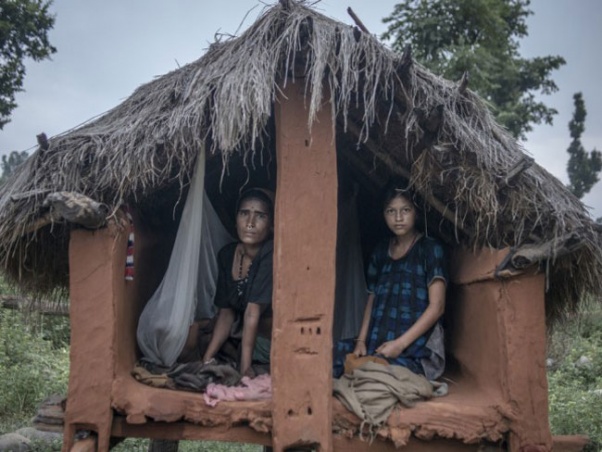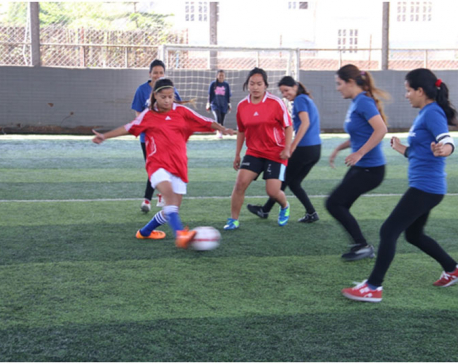
OR
Chhaugoth: fear of 'invisible' power continues to banish women from home during periods
Published On: April 22, 2018 02:30 PM NPT By: Hemant KC / RSS

JAJARKOT, April 22: Gita Khadka of Luhadaha of Junichande-4 in Jajarkot spends her first seven days in a shed far from her home during her monthly periods. She does not feel comfortable to live in isolation but cannot dare to violate this 'discriminatory' practice known as chhaupadi (ill-practice of excluding girl and women from family during their monthly cycle to an outhouse or shed) as she believes that it would displease the god and she have to face ill luck in return in the days ahead.
Such fear continues to abort all efforts so far meant for ending this harmful practice against women.
"I'm not a single person to practice this customary tradition. All women in the village who have entered their monthly cycle including my grandma, mother, sisters-in-laws are accustomed to it for a long," she said, adding that the practice is a norm for them, though they sometimes are encountered with unexpected hostility.
"If the god becomes angry with us, we are supposed to face ill luck lifelong," this is what Khadka believes. So we are ready to spend a week in a month in the exclusion, instead of living with the continuous fear of being cursed by the divine power, she added. "We have internalized this custom."
Parbati Khadka of Junichande is an eleven grade student at a local Adarsha Secondary School. As she said she is not an exception in her locality. She observes the Chhaupadi during the period. It does not mean that she is unaware of the criminalization of this practice by the government of Nepal and the new law that has been in force since August last year slaps a three-month jail term and a 3,000 rupee for those who force women to abide by this custom.
She knows the Chhaupadi is a wrong and discriminatory practice against women, but which force is driving her to the shed every month is the fear of 'invisible power.' They falsely believe that the violation of the practice would bring evil eye to their lives, families and the society.
More harrowing fact is that not only menstruating girls/women, but also the new mothers are forced to spend first 10 days in the shed. Local Prem Bahadur Khadka says though he need not follow this custom, he can feel to some level the pain and suffering the women face in Chhaupadhi and its consequences.
The old generation is rigid who want to see the continuity of this practice under any consequences while the new generation is yet to challenge the 'myths' and 'superstitions' attached to this, said a teacher at Adarsha Secondary School, Nepali Das Chaudhary. According to him, he has been teaching here since the past 18 years, but their efforts to convince the locals to break this tradition and end child marriage have not been completely meaningful.
Kabita Khadka shares that women also get a pressure from their family to observe the practice during the periods and after child birth. Segregation after the child birth exposes the new baby and mother to various health risks and sometimes takes lives of baby or mother or both.
Moreover, local health worker Pradeep Thapa mentions he sees over 12 women every month becoming ill following the Chhaupadi practice that demystifies the women's monthly cycle. Chhaudpadhi has been barrier to the girl education. They miss the opportunity for better performance in schools, as they cannot attend the class regularly due to confinement to the shed. Some girls even quit schools with the start of menstruation, said teachers here.
What is the local government doing?
The local government here is working on a plan to uproot the practice. The Junichande Rural Municipality says it is in touch with local youths and mothers' groups for their support to end this. It is relatively easier to convince young generation to put an end this tradition, but the older generation is so rigid, said Rural Municipality chair Krishna Bahadur KC. The Rural Municipality has planned to come up with a special programme to fight this bad custom. Besides, the local government has allocated budget to this regard.
KC hopes that elimination of this practice is not impossible provided that collective commitments and determination were there. RSS
You May Like This

Many women are barred from family toilets during periods
ACHHAM, Nov 24: Ramita Saud, 16, was excited when her family recently started constructing a toilet at their house. But a... Read More...

Futsal for the women, by the women and of the women!
KATHMANDU, March 19: WE United Project launched the Mahila Premier League (MPL) on March 18 at Grassroots Recreational Center in Mandikhatar. ... Read More...

A home away from home
As much as you want to, you simply cannot take your pets with you everywhere you go. Say, you have... Read More...










Just In
- Heavy rainfall likely in Bagmati and Sudurpaschim provinces
- Bangladesh protest leaders taken from hospital by police
- Challenges Confronting the New Coalition
- NRB introduces cautiously flexible measures to address ongoing slowdown in various economic sectors
- Forced Covid-19 cremations: is it too late for redemption?
- NRB to provide collateral-free loans to foreign employment seekers
- NEB to publish Grade 12 results next week
- Body handover begins; Relatives remain dissatisfied with insurance, compensation amount







Leave A Comment